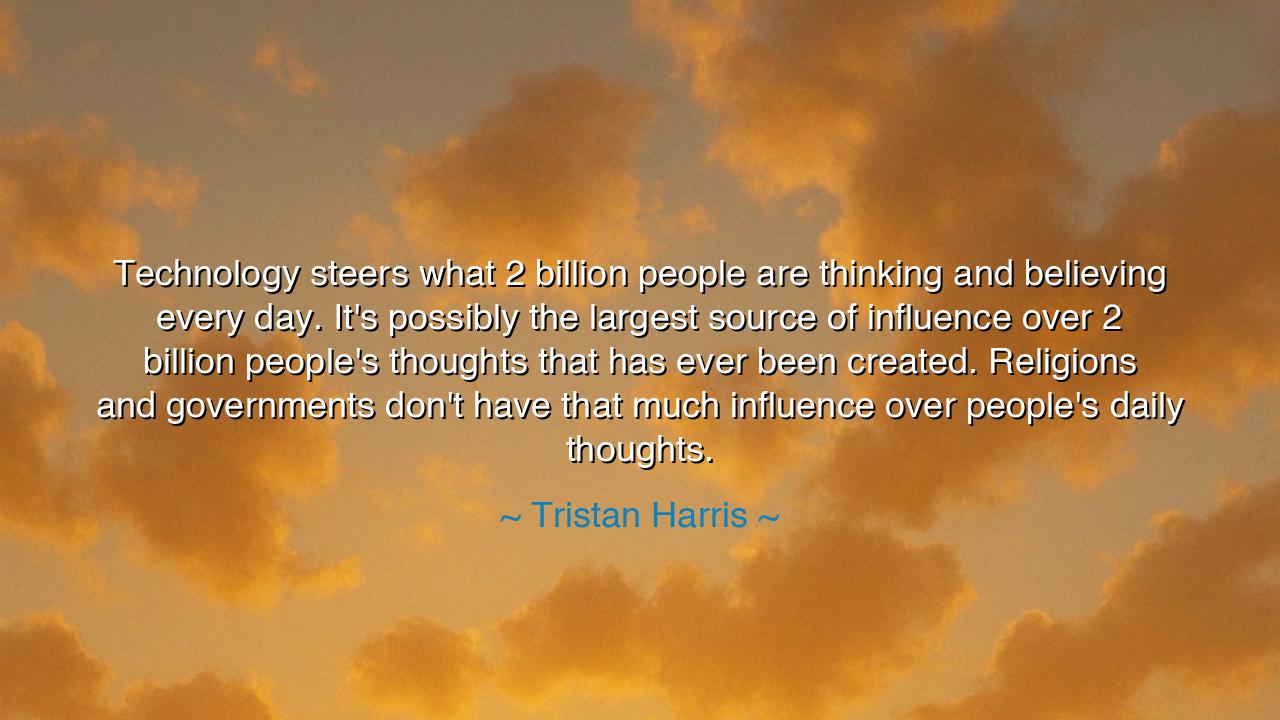
Technology steers what 2 billion people are thinking and
Technology steers what 2 billion people are thinking and believing every day. It's possibly the largest source of influence over 2 billion people's thoughts that has ever been created. Religions and governments don't have that much influence over people's daily thoughts.






Hear, O children of this age of glowing screens, the warning of Tristan Harris, who spake with solemn clarity: “Technology steers what 2 billion people are thinking and believing every day. It’s possibly the largest source of influence over 2 billion people’s thoughts that has ever been created. Religions and governments don’t have that much influence over people’s daily thoughts.” These words cut like a blade through illusion, reminding us that the throne of influence has shifted. No longer do kings or priests alone command the minds of the masses—now the unseen algorithms, crafted in hidden chambers, whisper into the ears of billions.
Mark well the magnitude of this power. Never before in the story of humankind hath one creation touched so many lives in so brief a time. Empires rose and fell over centuries, religions spread over millennia, but technology, through the Web and its devices, hath seized billions in but a generation. Each moment, a river of images, words, and voices is poured into the minds of men and women, shaping what they fear, what they love, what they desire, and even what they believe to be true. Such influence hath no equal in history.
Consider the tale of the printing press, which in its day was a revolution beyond imagining. When Gutenberg’s press spread, it broke the chains of knowledge held by the few and gave voice to the many. But even then, it took decades and centuries for the world to change. Compare this to the power of technology now: a message written in one corner of the earth may reach across continents in an instant, swaying hearts and stirring crowds before the sun hath set. This is the scale of power Harris describeth—a scale greater than any priest, prophet, or king hath ever wielded.
Yet, O seekers, let us not ignore the peril that followeth such power. For if technology may steer billions, then who guideth the rudder? Are they wise men with virtue, or merchants seeking profit, or unseen powers with hidden designs? Harris’s words are a trumpet sounding alarm: the greatest battle for human freedom is no longer fought with swords, but with thoughts—shaped daily, subtly, by what men consume through their devices. The danger is not only falsehood, but passivity: when people cease to choose what they believe, and instead allow technology to choose for them.
Reflect also on the empires of old. Rome conquered lands with legions, but it ruled hearts with spectacle—bread and circuses that lulled the people. So too in our age, the screen hath become the circus, the endless scroll the bread. Men and women are distracted, entertained, persuaded, and divided—all while thinking themselves free. Thus Harris warneth that the greatest influence may not be the one that commands openly, but the one that whispers unnoticed.
The lesson is clear: thou must guard thy mind as a fortress. Do not surrender it wholly to the streams of technology. Question what thou readest, discern what thou watchest, and choose consciously what thou allowest to enter thy heart. For though technology may shape the thoughts of billions, each soul still hath the power to resist, to awaken, and to think freely. The chains of influence are subtle, but they may be broken by awareness and discipline.
Practical is this counsel: set aside times to turn from the screen and return to silence, to nature, to true fellowship. Read deeply, not only widely. Seek truth not in what is most promoted, but in what is most enduring. Teach the young to ask, “Why is this shown to me? Who benefits from this message?” For in these questions lies freedom. Without them, thou art but a passenger steered by unseen hands.
Thus remember Tristan Harris’s words: “Technology steers what 2 billion people are thinking and believing every day.” This is no idle observation, but a warning written in fire. Take heed, O children of tomorrow: master the tools, lest they master you. Let not thy beliefs be stolen by invisible algorithms, but guard them as treasures. For the one who guards his own thoughts remaineth truly free, while the one who yieldeth them is already conquered.






AAdministratorAdministrator
Welcome, honored guests. Please leave a comment, we will respond soon